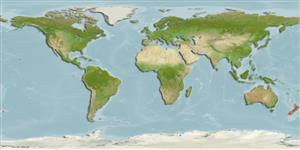Teleostei (teleosts) >
Pleuronectiformes (Flatfishes) >
Rhombosoleidae (South Pacific flounders)
Etymology: Peltorhamphus: Greek, pelteos, peltes = a fish named as "korakinos"; when it was salted received the name of "pelte" + Greek, rhamphos = bill (Ref. 45335).
More on author: Günther.
Environment: milieu / climate zone / depth range / distribution range
Ecology
Marine; demersal; depth range 27 - 49 m (Ref. 58489). Temperate
Southwest Pacific: New Zealand.
Size / Weight / Age
Maturity: Lm ? range ? - ? cm
Max length : 55.0 cm TL male/unsexed; (Ref. 126633); common length : 35.0 cm TL male/unsexed; (Ref. 9258); max. published weight: 600.00 g (Ref. 9258)
Inhabits shallow waters, generally at depth of less than 50 m. Juveniles gather in sheltered inshore waters, such as estuarine areas, shallow mudflats and sandflats, where they remain for up to two years (Ref. 9072).
Life cycle and mating behavior
Maturities | Reproduction | Spawnings | Egg(s) | Fecundities | Larvae
Robins, C.R., R.M. Bailey, C.E. Bond, J.R. Brooker, E.A. Lachner, R.N. Lea and W.B. Scott, 1991. World fishes important to North Americans. Exclusive of species from the continental waters of the United States and Canada. Am. Fish. Soc. Spec. Publ. (21):243 p. (Ref. 4537)
IUCN Red List Status (Ref. 130435)
Threat to humans
Harmless
Human uses
Fisheries: commercial; gamefish: yes
Tools
Special reports
Download XML
Internet sources
Estimates based on models
Preferred temperature (Ref.
123201): 11.2 - 18.2, mean 16.6 °C (based on 11 cells).
Phylogenetic diversity index (Ref.
82804): PD
50 = 0.6250 [Uniqueness, from 0.5 = low to 2.0 = high].
Bayesian length-weight: a=0.01413 (0.00689 - 0.02895), b=2.93 (2.73 - 3.13), in cm total length, based on LWR estimates for this species & (Sub)family-body (Ref.
93245).
Trophic level (Ref.
69278): 3.1 ±0.3 se; based on size and trophs of closest relatives
Resilience (Ref.
120179): Medium, minimum population doubling time 1.4 - 4.4 years (Preliminary K or Fecundity.).
Fishing Vulnerability (Ref.
59153): Moderate vulnerability (42 of 100).
